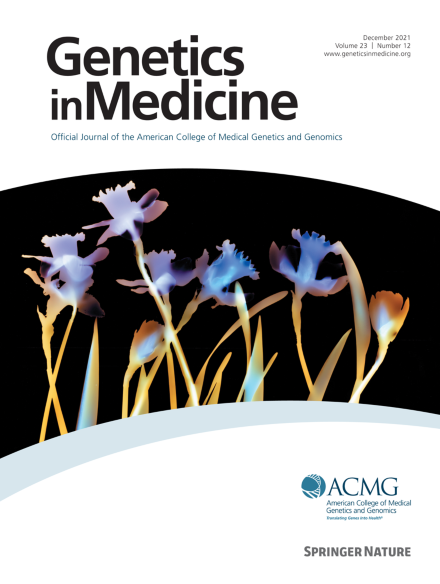对基于贝叶斯点的遗传性癌症易感基因变异分类系统的评估
IF 6.6
1区 医学
Q1 GENETICS & HEREDITY
引用次数: 0
摘要
目的:评估在115个遗传性癌症易感基因中使用ACMG/AMP 2015指南和贝叶斯点式分类系统(以下简称点式系统)进行变异分类的差异,并探讨点式系统对变异的分层:结果:共鉴定出2376个独特变异,其中23.5%的变异分类不一致。与 ACMG/AMP 2015(∼36%)相比,按评分系统分类的独特变异中,意义不确定变异(VUS;∼15%)的比例较低。这一变化归因于具有一个良性支持证据(∼12%)或一个良性强证据(∼4%)的独特变异被积分系统归类为可能良性。此外,具有冲突/修改证据的变异体(2376 个变异体中的 5%)也可通过计分制解决。对积分系统归类为VUS的独特变异体(n=354)进行细分,结果显示77.4%的变异体为VUS-低(0-1分),其余22.6%的变异体为VUS-中(2-3分)和VUS-高(4-5分):结论:积分制降低了 VUS 的发生率,有利于对其进行分层。结论:积分系统降低了 VUS 的发生率,并有助于对其进行分级。今后有必要开展大规模研究,探讨积分系统对改善 VUS 报告和/或 VUS 临床管理的影响。本文章由计算机程序翻译,如有差异,请以英文原文为准。
Evaluation of Bayesian point-based system on the variant classification of hereditary cancer predisposition genes
Purpose
To assess the differences in variant classifications using the American College of Medical Genetics and Genomics and the Association for Molecular Pathology 2015 guidelines and the Bayesian point-based classification system (here referred to as the point system) in 115 hereditary cancer predisposition genes and explore variant sub-tiering by the point system.
Methods
Germline variant classifications for 721 pediatric patients from an in-house panel were retrospectively evaluated using the 2 scoring systems.
Results
A total of 2376 unique variants were identified, with ∼23.5% exhibiting discordant classifications. Unique variants classified by the point system demonstrated a lower rate of variants of uncertain significance (VUS; ∼15%) compared with American College of Medical Genetics and Genomics and the Association for Molecular Pathology 2015 guidelines (∼36%). This change is attributed to unique variants with 1 benign supporting evidence (∼12%) or 1 benign strong evidence (∼4%) being classified as likely benign by the point system. Additionally, variants with conflicting/modified evidence (∼5% of 2376) are also resolved by the point system. Sub-tiering unique variants classified by the point system as VUS (n = 354) indicates ∼77.4% were VUS-Low (0-1 points), whereas the remaining ∼22.6% were VUS-Mid (2-3 points) and VUS-High (4-5 points).
Conclusion
The point system reduces the VUS rate and facilitates their sub-tiering. Future large-scale studies are warranted to explore the impact of the point system on improving VUS reporting and/or VUS clinical management.
求助全文
通过发布文献求助,成功后即可免费获取论文全文。
去求助
来源期刊

Genetics in Medicine
医学-遗传学
CiteScore
15.20
自引率
6.80%
发文量
857
审稿时长
1.3 weeks
期刊介绍:
Genetics in Medicine (GIM) is the official journal of the American College of Medical Genetics and Genomics. The journal''s mission is to enhance the knowledge, understanding, and practice of medical genetics and genomics through publications in clinical and laboratory genetics and genomics, including ethical, legal, and social issues as well as public health.
GIM encourages research that combats racism, includes diverse populations and is written by authors from diverse and underrepresented backgrounds.
 求助内容:
求助内容: 应助结果提醒方式:
应助结果提醒方式:


